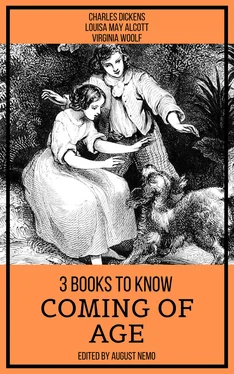

At the appointed time I returned to Miss Havisham's, and my hesitating ring at the gate brought out Estella. She locked it after admitting me, as she had done before, and again preceded me into the dark passage where her candle stood. She took no notice of me until she had the candle in her hand, when she looked over her shoulder, superciliously saying, "You are to come this way today," and took me to quite another part of the house.
The passage was a long one, and seemed to pervade the whole square basement of the Manor House. We traversed but one side of the square, however, and at the end of it she stopped, and put her candle down and opened a door. Here, the daylight reappeared, and I found myself in a small paved court-yard, the opposite side of which was formed by a detached dwelling-house, that looked as if it had once belonged to the manager or head clerk of the extinct brewery. There was a clock in the outer wall of this house. Like the clock in Miss Havisham's room, and like Miss Havisham's watch, it had stopped at twenty minutes to nine.
We went in at the door, which stood open, and into a gloomy room with a low ceiling, on the ground floor at the back. There was some company in the room, and Estella said to me as she joined it:
"You are to go and stand there, boy, till you are wanted."
"There", being the window, I crossed to it, and stood "there," in a very uncomfortable state of mind, looking out.
It opened to the ground, and looked into a most miserable corner of the neglected garden, upon a rank ruin of cabbage-stalks, and one box tree that had been clipped round long ago, like a pudding, and had a new growth at the top of it, out of shape and of a different colour, as if that part of the pudding had stuck to the saucepan and got burnt. This was my homely thought, as I contemplated the box-tree. There had been some light snow, overnight, and it lay nowhere else to my knowledge; but, it had not quite melted from the cold shadow of this bit of garden, and the wind caught it up in little eddies and threw it at the window, as if it pelted me for coming there.
I divined that my coming had stopped conversation in the room, and that its other occupants were looking at me. I could see nothing of the room except the shining of the fire in the window glass, but I stiffened in all my joints with the consciousness that I was under close inspection.
There were three ladies in the room and one gentleman. Before I had been standing at the window five minutes, they somehow conveyed to me that they were all toadies and humbugs, but that each of them pretended not to know that the others were toadies and humbugs: because the admission that he or she did know it, would have made him or her out to be a toady and humbug.
They all had a listless and dreary air of waiting somebody's pleasure, and the most talkative of the ladies had to speak quite rigidly to repress a yawn. This lady, whose name was Camilla, very much reminded me of my sister, with the difference that she was older, and (as I found when I caught sight of her) of a blunter cast of features. Indeed, when I knew her better I began to think it was a Mercy she had any features at all, so very blank and high was the dead wall of her face.
"Poor dear soul!" said this lady, with an abruptness of manner quite my sister's. "Nobody's enemy but his own!"
"It would be much more commendable to be somebody else's enemy," said the gentleman; "far more natural."
"Cousin Raymond," observed another lady, "we are to love our neighbour."
"Sarah Pocket," returned Cousin Raymond, "if a man is not his own neighbour, who is?"
Miss Pocket laughed, and Camilla laughed and said (checking a yawn), "The idea!" But I thought they seemed to think it rather a good idea too. The other lady, who had not spoken yet, said gravely and emphatically, "Very true!"
"Poor soul!" Camilla presently went on (I knew they had all been looking at me in the mean time), "he is so very strange! Would anyone believe that when Tom's wife died, he actually could not be induced to see the importance of the children's having the deepest of trimmings to their mourning? 'Good Lord!' says he, 'Camilla, what can it signify so long as the poor bereaved little things are in black?' So like Matthew! The idea!"
"Good points in him, good points in him," said Cousin Raymond; "Heaven forbid I should deny good points in him; but he never had, and he never will have, any sense of the proprieties."
"You know I was obliged," said Camilla, "I was obliged to be firm. I said, 'It WILL NOT DO, for the credit of the family.' I told him that, without deep trimmings, the family was disgraced. I cried about it from breakfast till dinner. I injured my digestion. And at last he flung out in his violent way, and said, with a D, 'Then do as you like.' Thank Goodness it will always be a consolation to me to know that I instantly went out in a pouring rain and bought the things."
"He paid for them, did he not?" asked Estella.
"It's not the question, my dear child, who paid for them," returned Camilla. "I bought them. And I shall often think of that with peace, when I wake up in the night."
The ringing of a distant bell, combined with the echoing of some cry or call along the passage by which I had come, interrupted the conversation and caused Estella to say to me, "Now, boy!" On my turning round, they all looked at me with the utmost contempt, and, as I went out, I heard Sarah Pocket say, "Well I am sure! What next!" and Camilla add, with indignation, "Was there ever such a fancy! The i-de-a!"
As we were going with our candle along the dark passage, Estella stopped all of a sudden, and, facing round, said in her taunting manner with her face quite close to mine:
"Well?"
"Well, miss?" I answered, almost falling over her and checking myself.
She stood looking at me, and, of course, I stood looking at her.
"Am I pretty?"
"Yes; I think you are very pretty."
"Am I insulting?"
"Not so much so as you were last time," said I.
"Not so much so?"
"No."
She fired when she asked the last question, and she slapped my face with such force as she had, when I answered it.
"Now?" said she. "You little coarse monster, what do you think of me now?"
"I shall not tell you."
"Because you are going to tell, up-stairs. Is that it?"
"No," said I, "that's not it."
"Why don't you cry again, you little wretch?"
"Because I'll never cry for you again," said I. Which was, I suppose, as false a declaration as ever was made; for I was inwardly crying for her then, and I know what I know of the pain she cost me afterwards.
We went on our way up-stairs after this episode; and, as we were going up, we met a gentleman groping his way down.
"Whom have we here?" asked the gentleman, stopping and looking at me.
"A boy," said Estella.
He was a burly man of an exceedingly dark complexion, with an exceedingly large head and a corresponding large hand. He took my chin in his large hand and turned up my face to have a look at me by the light of the candle. He was prematurely bald on the top of his head, and had bushy black eyebrows that wouldn't lie down but stood up bristling. His eyes were set very deep in his head, and were disagreeably sharp and suspicious. He had a large watchchain, and strong black dots where his beard and whiskers would have been if he had let them. He was nothing to me, and I could have had no foresight then, that he ever would be anything to me, but it happened that I had this opportunity of observing him well.
Читать дальше















